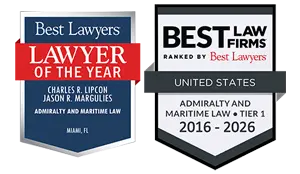
Charles Lipcon was interviewed by Sky Radio for American Airlines in September of 2005. Sky Radio named Lipcon one of America’s Best Lawyers.
This interview, available for you to listen to on our web site, was playing on American Airlines flights in 2005 and 2006, and heard by millions of people around the world.
Subject: Charles Lipcon Interview
Program: Sky Radio for American Airlines
Transcript of Radio Interview:
Radio Host:
Americans have taken to the seas, the number of ships is increasing and over 18 million passengers a year are predicted to take a cruise this year but most people are unaware of their rights if things go wrong. Are you? Joining us with an overview is Charles Lipcon who’s been handling admiralty claims since 1972. Charles, who is president of the Miami Law Firm of Lipcon, Marguilies & Alsina, publishes the cruise lines law reporter and has appeared on numerous TV shows including Court TV, A Current Affair & The O’Reily Factor. Welcome.
Charles Lipcon:
Thank you.
Radio Host:
Now why are passengers so murky in their thoughts when it comes to understanding their maritime rights? Why is cruise law so unknown?
Charles Lipcon:
Well, when most passengers get on a ship they think they’re in the United States and they’re really not. If you look at the flag that the ship is flying, if it’s a bohemian flag or Liberian flag or a Panamanian flag, they’re really in those countries. So rather than being in the United States they’re in Panama or Liberia. Part of their confusion starts there.
Radio Host:
Hm hm.
Charles Lipcon:
The second part stems out of the fact that most cruise lines operate out of the United States and there’s concurrent jurisdiction with respect to certain matters, as an example of the crimes committed on a ship the FBI could get involved if the perpetrator or the victim is a U.S. citizen or resident or if the ship begins or ends its voyage in the United States. A third possible jurisdiction is where the vessel is at the time of the incident. So if it’s in a territorial waters, of let’s say Greece or Turkey, then Greek or Turkish law could apply. So you can easily have one, two, three or even four different laws applying at the same time.
Radio Host:
How is that determined then?
Charles Lipcon:
Well it’s determined by the court. Usually if it’s criminal matter, from what I’ve seen over the thirty years I’ve been practicing this kind of law, it’s a hot potato and each jurisdiction tries to pass it off to another jurisdiction so that nobody wants to get involved.
Radio Host:
So what should passengers do if they find themselves a victim of a crime, whom should they call first?
Charles Lipcon:
Well, immediately report it to the security on the ship but then go a step further and actually from the high seas call the Federal Bureau of investigation and get them involved and at the next port of call, call in the local law enforcement authorities and get the ball rolling so that an investigation can be done early. If available evidence is lost that means they won’t be able to determine who the perpetrators were or obtain a conviction.
Radio Host:
So what would the statute of limitations be on reporting a crime?
Charles Lipcon:
In the civil matter, this is really important because there’s many accidents on cruise ships, the cruise lines can limit the time in which to be sued to a period of one year. This is a big trap for many passengers who are injured in accidents or even their lawyers who don’t know admiralty law so they have to really get right on it and take action immediately.
Radio Host:
Let’s talk about the Carlisle vs the Carnival Cruises case, I know that was a real landmark.
Charles Lipcon:
Yes, it was, it was twenty years in the making. Traditionally the law has been that cruise lines are not liable for bad medical care by their doctors onboard the ships, on the theory that the doctors were independent contractors. Recently, changing almost 250 years of prior admiralty law, the courts have ruled that the cruise lines are responsible for the ship board doctors, but the story is not over. Coming up is a hearing in front of the Florida Supreme Court which will either affirm that decision or change it.
Radio Host:
Well we’ll be looking out for that. Thank you so much for your information here.
Charles Lipcon:
You’re welcome.
Radio Host:
We’ve been speaking with Charles R. Lipcon, he’s president of Lipcon, Margulies & Alsina. We reached him by phone in their offices in Miami, Florida.








